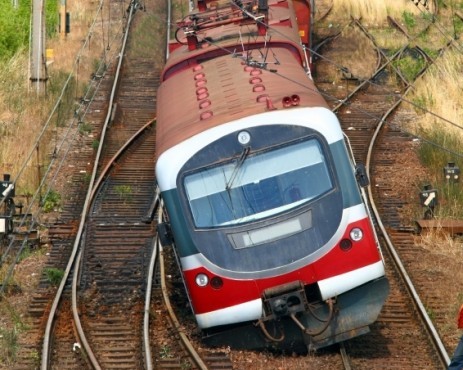 Rather than switching to innovative transportations modes like speed trains, deficit hysteria is relegating us to outdated technologies like the car. Photo: FreeFoto.comA month ago, with the climate bill still on life support, I argued that greens needed to move on from climate legislation and get seriously engaged in economic policy.
Rather than switching to innovative transportations modes like speed trains, deficit hysteria is relegating us to outdated technologies like the car. Photo: FreeFoto.comA month ago, with the climate bill still on life support, I argued that greens needed to move on from climate legislation and get seriously engaged in economic policy.
My argument went like this: The economy is stalled at 9.5 percent unemployment and desperately needs a jolt of government stimulus; interest rates on government borrowing are at rock bottom; to create the new energy and food systems in a carbon-constrained future of dwindling fossil fuels, we’ll need new infrastructures; therefore, it’s time to push for a green stimulus plan to put people to work and build out those infrastructures.
In the weeks since then, the climate bill officially died. Meanwhile, the bad economy is starting to prove disastrous for what little green-economy infrastructure we have. Last week, the New York Times‘ Michael Cooper published a jaw-dropping piece on how cash-strapped states are slashing vital public services. Writes Cooper:
Faced with the steepest and longest decline in tax collections on record, state, county, and city governments have resorted to major life-changing cuts in core services like education, transportation and public safety that, not too long ago, would have been unthinkable. And services in many areas could get worse before they get better.
The cuts to education budgets are probably most chilling, but for our purposes, let’s look at the case of mass transit. “Public transportation has taken a beating during the downturn,” Cooper reports. “In most places, that has meant longer waits for more crowded, dirtier and more expensive trains and buses.” Of course, when you take a generally underfunded and inconvenient mass-transit system, slash its funds and make it less convenient, you’re sending a stark signal to the citizenry: mass transit sucks.
Is that really the message we want to be sending now? Of course, mass transit is so generally wretched here in the United States that tens or hundreds of millions of people actually need to own a car in order to function in the economy. And as Cooper makes clear, the meltdown in mass transit funding means that number is growing, not shrinking. He cites the case of Clayton County, Georgia, a “struggling suburb south of Atlanta” and home to the city’s bustling airport. Plunging tax revenues have forced the county to eliminate its bus system — and forced its 8,400 former riders to make hard choices. Cooper writes:
Jennifer McDaniel, a hostess at a Chili’s in the airport, was forced to spend her tax refund, and take out a big loan, to buy a car. Jaime Tejada, 36, a Delta flight attendant, wondered why transit was so much better in the countries he flies. And Tierra Clark, 19, who studies dental hygiene and works five nights a week at the Au Bon Pain at the airport, was left with an unwanted new expense. “I’ll have to call a taxi from now on – $13.75 every night,” Ms. Clark said, as she rode the very last C-Tran bus home.
In other words, Hey losers, get a car!
But nations that make mass-transit riders feel like losers are themselves zooming toward loser status. Fossil fuel supplies are shrinking as the consequences of burning them become more dire. Now is precisely the time to build out a high-functioning transit system. Instead, we’re letting the current pathetic one decay into oblivion.
I’m well aware that, aided by feckless or deluded Democrats, Republican politicians and pundits have managed to create an atmosphere of deficit hysteria — the idea that the biggest problem facing the nation is public debt, and the only way forward is to slash public spending. No less a figure than former Treasury Secretary Robert Rubin recently pounded the drums of deficit hysteria. Why anyone still listens to Rubin, architect of Clinton-era financial deregulation and a promoter of high-risk behavior during his inglorious, lucrative run at Citigroup, is beyond me. Yet Rubin is the mentor to key Obama economic-team players Tim Geithner and Larry Summers, and remains highly influential.
Deficit hysteria today is as wrong-headed — and, indeed, reckless — as pushing a massive bank into mortgage-backed securities in 2005. In a recent Daily Beast op-ed, University of Texas economist James K. Galbraith obliterates the case for deficit hysteria. If the U.S. were facing a true budget crisis, he argues, investors would be fleeing, driving up rates on government bonds. Instead, the opposite is happening. Moreover, while deficit hysterics brandish the specter of inflation, the Federal Reserve is currently fretting about the opposite phenomenon, tied directly to the flailing economy: deflation. Galbraith slays the inflation bogeyman in a single lucid sentence:
World inflation disappeared 30 years ago with the collapse of union power, global commodity gluts, and the rise of low-wage manufacturing in (especially) China.
He concludes:
Care for the elderly, energy, climate change, the Gulf of Mexico catastrophe, our decayed infrastructure, public health-these are real issues. Let’s deal with them. The “long-term budget deficit” is a phony problem, ginned up by politicians, some economists, and the historic enemies of Social Security and Medicare on Wall Street. For God’s sake, let’s not sacrifice our most successful social programs to the hysteria we’re hearing from them.
And for God’s sake, let’s build out our vital green-economy infrastructure, and not let it decay as yet more people are pushed into the ecological disaster of car ownership. I realize that Obama and the Democrats lack the political will — and clout — to push through a major green-spending program. But when politicians flounder, it’s the role of social movements to set them right.



